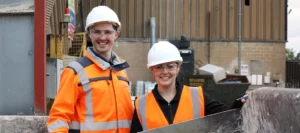Humberside could become ‘world’s first’ net zero-carbon region
Humberside could become the ‘world’s first’ net-zero carbon region after Drax Group, Equinor and National Grid Ventures announced a new partnership to develop carbon capture and storage technology.
Drax, who owns the UK’s largest power station has signed an agreement with Norwegian energy firm Equinor and the commercial arm of the National Grid to explore how they can upscale their carbon capture and storage (BECCS) pilot project, which is currently underway at their Selby site, in order to create the ‘world’s first’ carbon negative power station by the mid-2020s.
The Committee for Climate Change (CCC) recently recommended the UK government should set a target of 2050 for a net-zero emissions economy and said carbon capture and storage technology is a ‘necessity and not an option’ in order to meet that goal.
Drax’s Selby site is already capturing a tonne of carbon dioxide a day from its bioenergy carbon capture and storage (BECCS) pilot project. If it is scaled up they believe it could act as a regional ‘anchor’ for carbon capture, capturing millions of tonnes of carbon each year from nearby industrial emitters.
However, they are already under pressure to cut emissions the rest of the Selby site, including the four combined cycle gas turbines (CCGT) that will replace its existing two coal-fired units which environment lawyers ClientEarth said would produce 75% of the emissions budget for the entire UK power sector.
The agreement will also explore the potential development of a large-scale hydrogen demonstrator within the Drax site by as early as the mid-2020s, in line with the CCC’s recommendation that hydrogen should be produced at scale in at least one industrial cluster by 2030.
Will Gardiner, Drax Group CEO, said: ‘The Committee on Climate Change was clear – the UK needs both bioenergy with CCS and hydrogen production at scale by 2030 to achieve a ‘net zero’ carbon economy. This partnership is committed to meeting this challenge putting Great Britain at the heart of the global energy revolution.
‘With Drax’s carbon negative power station, the Humber region could lead the world in new technologies that can deliver for the climate and the economy, helping to create a cleaner environment for future generations whilst creating new jobs and export opportunities for British businesses.
‘We’re excited to be working with National Grid Ventures and Equinor on this project – for decades the Humber has been a strategically important industrial cluster for the UK – it has the skills, industrial capability as well as offshore storage to transform itself into a cutting-edge low carbon hub.’
A study outlining the technical, economic and societal opportunities for CCUS and hydrogen in the Humber region will be published by the partners later this year.
Photo credit – Drax Group
















